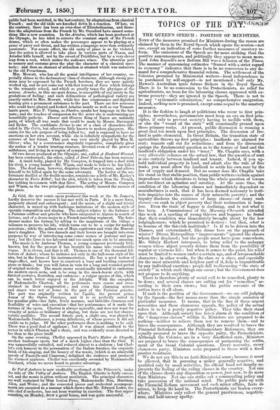Xe aii4 the new comic opera produced this week at
the St. James's, hardly deserves the success it has met with in Paris. It is a mere farce, purposely absurd and extravagant; and the music, of a slight and trivial character, is mixed up with burlesque imitations of the modern style of operatic composition and singing. The subject relates to the fortunes of a Parisian coiffeur and grisette who have emigrated to Algiers in search of fortune, and of a drum-major in a French marching regiment. The hair- dresser makes his fortune by selling to the magistrate of the village a talisman to preserve his life, which turns out to be a recipe for making pomatum; while the gallant son of Mars captivates and wins the Mussel- man's daughter. The two damsels and their lovers are brought into cross purposes by way of introducing some comic scenes of jealousy and pas- sion but the farce is too laboured and too much spun out to be amusing. The 131119/0 is by Ambrose Thomas, a young composer previously little known, but for the present it has brought his name into considerable vogue. It is clever, awl that is all. Thomas is one of the thousand fol- lowers of Auber ; whom he imitates not only in the ball-room style of his airs but in the forms of his instrumentation. He has a good notion of stage-effect, and knows how to construct a busy and bustling concerted piece or finale ; but you -will listen in vain for a long and rounded period of original melody. The music seems occasionally intended to caricature the modern opera seria, and to be sung in the mock-heroic style, with farcical gestures, flourishes, and cadenzas : a vulgar species of fun, which can be much better enjoyed at the Adelphi. With the exception of Mademoiselle Charton, all the performers were coarse and over- strained in their exaggeration-; and even this charming actress and sing& was not at home in the part of the Parisian grisette. The part was originally written for Ligalde, the present prima donna of the Opera Comique, and it is so perfectly suited to her peculiar gifts—her light, lively manner and bird-like clearness and flexibility of voice and execution—that her performance of it made the fortune of the opera. Charton is always agreeable, and does not want for vivacity of action or brilliancy of singing, but these are not her charac- teristic qualities. The second female part, a slight one, was played by Mademoiselle Danhanser, a young debutante, of whose powers it did not enable us to judge. Of the other performers there is nothing to be said. There was a good deal of applause • but it was almost confined to the scenes in which Charton hint a sha;e, and was evidently more directed to her than to the piece itself.
On the same evening, Cholla appeared in Pafir's Maitre de Chapelle, another burlesque opera, but of a much higher class than the 'Cad. It was unmercifully curtailed, and reduced almost to a skeleton • but Chol- let's rich humour in the personation of the Italian fanatic°, the exquisite finish of his singing, and the beauty of the music, (which is an admirable parody of Paesiello and Cimarosa,) delighted the audience and produced the warmest applause. Chollet.was excellently seconded by Mademoiselle Guichard, whom we never heard to greater advantage.


























 Previous page
Previous page